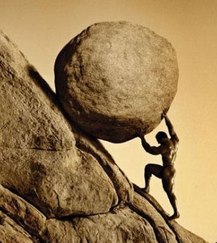Working skillfully with procrastination and avoidance to create a steady practice  Probably everyone who has ever tried to take up a meditation practice has encountered it: Resistance. I don't feel like it. I'll do it later. I forgot. Resistance is the biggest obstacle to regular practice, so it deserves some inquiry. What is resistance, and how can we most skillfully work with it? Resistance is a toxic force. Its aim is to push us away from practice, to distract us, to prevent us from taking up the Way. Its favorite tactics include privileging immediate gratification, rationalization ("I don't have time"), procrastination, and avoidance. Resistance can seem to come from outside ourselves, as kids, work, and obligations. But the truth is, Resistance is self-generating and self-perpetuating. Resistance is only loyal to itself, and it uses our fear and greed as its front line. Resistance doesn't want us to take up a meditation practice, because if we do, we threaten its existence and its dominance over us. In order to work with Resistance, we must change our mindset and our loyalty. The move here is from fear and greed, to commitment. In Zen we call this taking a vow. When we take up the path of practice, we make that our north star; we orient our lives toward that. Then it doesn't matter much what I want or what I'm afraid of; I'm going to practice anyway. Not that the fear and cravings go away; they don't. But we don't have to obey them, and they don't set the terms of what we do. You actually know how to do this if you have a job. You go to work whether you feel like it or not. You show up, you stay even when things are difficult, you are committed over the long haul. Having a committed practice is like this. We show up no matter what. We don't make excuses. We invest time and energy and love into what we are doing. We don't quit when things are difficult. We seek out community and teachings and opportunities to grow. When you begin to shift from Resistance to Vow, incredible changes can happen. You can fundamentally re-align your life. And we are here to support you in this transformation.
1 Comment
We are trained from an early age to answer questions. We spend years in school gaining knowledge and skills; there is a high value on getting the “right answer.” We prefer certainty, clarity, knowledge.
But the way of the Buddha values questions themselves, without the compulsion to get an answer. Our very existence poses big questions to us, which we can take up in our meditation. Who am I? Why are we here? Why is there suffering? What’s the meaning of life? What happens after we die? This path allows us to pour ourselves into our question, never resting on any answer. We may find confusion, not knowing, and provisional answers, and still, we keep going further. In our tradition, we talk about being able to respond to a question, rather than answer it. Our response can be a living response, which is never fixed. To be able to really live into questions and responses is to cultivate what the poet Keats called “negative capability,”, the ability to be “capable of being in uncertainties, mysteries, doubts, without any irritable reaching after fact and reason.” Once we find something we believe in, some certainty, we tend to abandon the original question. But for psychotherapists and other healers, the capacity for negative capability vastly expands the territory that is available to us, as well as our responsiveness. It’s one reason why I believe that Zen practice, and in particular koan practice, which is all about questions, is so helpful to us in our work (as well as the rest of life). There are several opportunities this fall to take up your own burning questions. There will be a four-week Introduction to Meditation for Mental Health Professionals workshop in September (for more information, go here). We will also have a forty-day practice period beginning in October. Plus a day-long retreat and a five-day sesshin coming up as well. If you are interested in cultivating the field of question and response in a community of others on the same path, join us! |
Details
AuthorMegan Rundel is the resident teacher at the Crimson Gate Meditation Community in Oakland, CA.. Archives
April 2020
Categories
|

 RSS Feed
RSS Feed